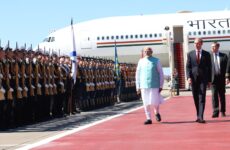 New Delhi, India’s economic growth rate will accelerate to 6.5 percent next year and 7 percent thereafter, Finance Minister Arun Jaitley said on Friday.
New Delhi, India’s economic growth rate will accelerate to 6.5 percent next year and 7 percent thereafter, Finance Minister Arun Jaitley said on Friday.
Economic growth fell to sub-5 percent in two consecutive fiscals in 2012-13 and 2013-14, he said, adding it had an impact on revenue collection, fiscal deficit and government’s expenditure on developmental works.
He further said that the government is working overtime to push reforms.
The Coal Mines (Special Provisions) Bill, which replaces an ordinance, was brought in the wake of the Supreme Court order cancelling the allocation of 204 coal blocks on September 24 and resetting the agenda for their allocation.
In a bid to roll out the GST, which would subsume excise and service taxes, the Centre has come out with a new Constitutional Amendment Bill.
GST is being targeted to be implemented by April 2016.
The GST will subsume indirect taxes like excise duty and service tax at the central level and VAT and local levies on the states front.
Jaitley further said: “In my meeting with the empowered committee with state finance ministers on July 3, 2014, I had committed that the partial payment of the outstanding CST compensation will be released this year.”
“GST is not an issue on which we are divided on partisan line. Most state governments are going to benefit. The revenues are going to improve as far as the centre is concerned, states are concerned and I wish to just assure this house with this commitment,” the Finance Minister said.
The GST Constitutional Amendment Bill, which was introduced in the Lok Sabha in 2011, had lapsed and the NDA government will be required to come up with a fresh bill.
States have been demanding that petroleum, alcohol and tobacco be kept out of the purview of the GST.
The GST roll out has missed several deadlines because of lack of consensus among states over certain crucial issues on the proposed new tax regime.
Referring to the Select Committee report on further opening of insurance sector, Jaitley said, “Large investments are waiting to come in. We have to open the doors.”
The committee has suggested a composite foreign investment cap of 49 percent in the insurance sector, as against 26 per cent FDI cap currently.
The government would endeavour to usher in a “civilised tax policy” to attract overseas investments, he said, adding FDI regime has already been relaxed in defence sector and has generated lot of interest from top global manufacturers.
With agency inputs




 Driving Naari Programme launched in Chandigarh
Driving Naari Programme launched in Chandigarh






























